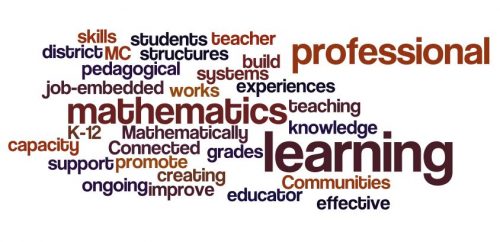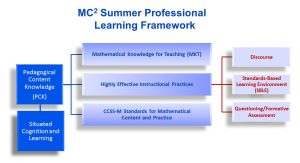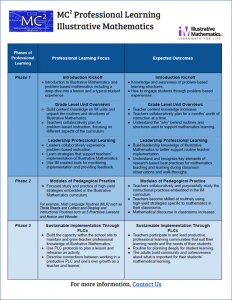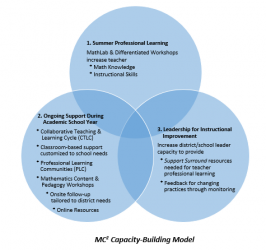-
The following instructional practice workshops are needed to support mathematics teaching for daily student learning:
Growth Mindsets
A growth mindset stresses that success and learning in mathematics are a reflection of effort and not intelligence alone, and thus promotes a belief that all students are capable of participating and achieving in mathematics. Encouraging the development of student growth mindsets in the classroom situates mathematics teaching and learning as processes that cultivate mathematical abilities.
Standards-Based Learning Environment (SBLE)
SBLE is a learning environment in which the classroom culture is established through purposeful routines that support full student engagement in rich mathematical reasoning and student discourse. These routines provide a structure for accessing student voice and knowledge while building both conceptual and procedural understanding of important math concepts. The SBLE is a student-centered classroom where students and teachers understand the value of thoughtful problem-solving, sharing multiple perspectives, and peer interactions to build profound and flexible math understanding.
Launch/Explore/Summarize (LES) Lesson Model
LES is a problem-centered instructional model that opens the mathematics classroom to exploring, conjecturing, reasoning, and communicating. This model is very different from the “transmission” or “direct instruction” model, in which teachers tell students facts and demonstrate procedures and then students memorize the facts and practice the procedures. The LES model looks at instruction in three phases: launching, exploring, and summarizing.
Discourse and Questioning
Effective teaching of mathematics requires teachers to facilitate discourse among students to build shared understanding of mathematical ideas by analyzing and comparing student approaches and arguments. Teachers use the way students talk about – think about – represent their math ideas to craft mathematics learning for all students. Student discourse about mathematics is what drives the learning connections in the classroom. Teachers must be skilled in high-leverage instructional practices that improve the quality of the discussions we have about math in our classrooms (e.g., talk moves, questioning, using student thinking, supportive environment and facilitating discourse). -
Mathematically Connected Communities (MC²) can offer elementary educators significant professional learning experiences for Kindergarten through 5th grade teachers.
Grades K-2: Building Fluency Using Models
In K–2 classrooms, the development of numeracy sense begins with counting numbers one by one and progresses to more complex skills such as subitizing and the ability to decompose and compose. The acquisition of these important early numeracy skills cannot be informal or left to chance. Instruction must be systematic, thought-provoking, and engaging. Teachers must use questioning to teach deep understanding and involve students in learning and encourage higher-level thinking through discovery and collaboration.Grades K-2: Extending Fluency Using Models to Higher Decade Addition & Subtraction
Continuation of Building Fluency Using Models Workshop
Grades K-5: Number Talks
- Learn the power of Number Talks to promote mathematical reasoning aligned to the Common Core State Standards-Mathematics (CCSS-M) and Mathematical Practices
- Develop a plan for building fluency with operations appropriate for your grade level
- Engage in strategic planning focused on a progression of tasks and pedagogical tools that support and extend student thinking
Grades 3-5: MC2 Multiplicative Reasoning Workshop Series (It is recommended that participants attend all 3 of the days below; however, Day 3 may be provided separately.)
Day 1: Multiplicative Reasoning in Grades 3-5
Focuses on how children develop understanding of multiplication concepts that leads to strong mathematical reasoning and fluency. In the morning, we will work across grades 3-5 to understand the multiplication trajectory while engaging in rich math activities that can be used across grade levels to build fluency. In the afternoon, we will work in grade-specific groups to target multiplication standards by grade level. Participants will leave the workshop with activities and games that build conceptual and procedural understanding of multiplication.
Day 2: More Multiplicative Reasoning with Number Talks
Continues to explore classroom strategies for supporting children’s multiplicative reasoning. Participants will experience Number Talk sequences, rich mathematics tasks, and games leading to stronger understanding of multiplication concepts.
Day 3: Making Sense of Student’s Multiplicative Thinking through Student Work
The Making Sense of Student Work (MSSW) protocol developed by WestEd is a powerful process for understanding student thinking and planning instruction to target specific learning needs of students. The process is an ideal tool for strengthening teacher collaboration and student achievement in mathematics. We will use student work from our classrooms to engage in the MSSW process and consider the specific next steps that will support children’s multiplicative reasoning.
Grades 3-5: Measurement to Build Understanding of Operations
- Have fun integrating measurement, mathematical practices, and the four basic operations to develop problem solving and mathematical reasoning related to Grades 3-5 Common Core State Standards (CCSS-M)
- Develop greater facility with choosing and explaining the operations that can be used to solve interesting measurement tasks
- Master copies of lessons and materials for classroom use will be provided
-
Mathematically Connected Communities (MC²) can offer secondary educators significant professional learning experiences for 6th through 12th grade teachers.
Grades 6-8: Probability and Statistics
- Build teachers’ conceptual understanding of probability and statistics concepts outlined in the Grades 6-8 CCSS-M
- Engage in lessons appropriate for students in grades 6-8 that can be used in your classrooms
Grades 6-8: Geometry Connections to Ratios and Proportions
This workshop will allow middle school educators to gain a greater understanding of how 6th and 7th grade students learn mathematics. Participants will acquire resources including evidence-based intervention strategies for use with students who are struggling and professional knowledge for identifying and analyzing student misconceptions.
Grades 6-10: Number Talks Workshop Series (It is recommended that participants attend both days; however, each day may be provided separately)
Part I: Number Talk Basics with Whole Number Operations
- Learn the power of Number Talks to promote mathematical reasoning aligned to the CCSS-M standards and mathematical practices
- Develop strategies for representing students’ math ideas strategically using notation to build understanding
- Engage in strategic planning focused on a progression of tasks for building fluency with operations appropriate for your grade level
Part II: Extending Number Talks to Fractions, Decimals, and Integers
- Learn to use Number Talks to support fluency with fraction and decimal operations
- Practice a sequence of Number Talks for building fraction and decimal understanding
Note: Part II is intended for teachers routinely using Number Talks in their classrooms and/or who have attended Number Talks Part I.
Grades 6-10: Functions
- Build teachers’ conceptual understanding of linear, quadratic, and exponential concepts
- Engage in activities that support students developing conceptual understanding of these different types of functions
Grades 9-12: Conceptual Understanding of Completing the Square
-
Onsite support can provide campus-specific support for implementation of professional learning including the topics below:
- Professional Learning Communities (PLC): Planning instruction aligned to the Common Core State Standards-Mathematics (CCSS-M) and PARCC expectations
- Collaborative Teaching and Learning Cycle (CTLC): Planning, practicing in the classroom, and reflecting on student learning with colleagues. The purpose of the CTLC is to study implementation of new instructional practices in the classroom.
- Interactive Classroom Professional Learning (Half-day): Teachers 1) deepen their knowledge of how students develop understanding in mathematics, 2) try out instructional activities in classrooms to support progressive conceptual development with small groups, and 3) reflect on what they observed and learned as they worked with students.
- Practice Implementation of New Instructional Strategies: Number Talks, Compendiums, etc.
-
Our professional learning model is based on a partnership of district/school leaders, teachers, and MC2 staff.
Workshops (Developing Professional Knowledge): Modified to support school/district needs (includes collaborative conversations about learning needs, planning, materials, and facilitation by math education content specialists) What might this look like?
- Full-Day Workshop: $2,500 (Up to 25 participants)
- Half-Day Workshop: $1,500 (up to 25 participants)
- Small School Discount: Inquire Here
- Plus Travel Expenses:
- Mileage from NMSU, Las Cruces: $0.575/mile
- Per Diem including Hotel: $150-$300/Day (If facilitators must stay overnight)
- Virtual Workshop: $1,200-$2,500
*Adjusted based on number of facilitators needed.
Onsite support is available as a follow-up to workshops as a Deep Dive into implementation of Professional Learning: Modified to support grade level/band or department needs (includes collaborative conversations about learning needs, planning, materials, and facilitation by math education content specialists) What might this look like?
- Facilitator: $1,200/Day (Up to 10 teachers)
- Small-School Discount: $800/Day (up to 4 teachers)
- Plus Travel Expenses:
- Mileage from NMSU, Las Cruces: $0.575mile
- Per Diem including Hotel: $150-$300/Day (If facilitator must stay overnight)
- Virtual Onsite Support: $600-$1,200
*Adjusted based on number of facilitators needed.
Contact us for price quotes based on your customized professional learning needs.






